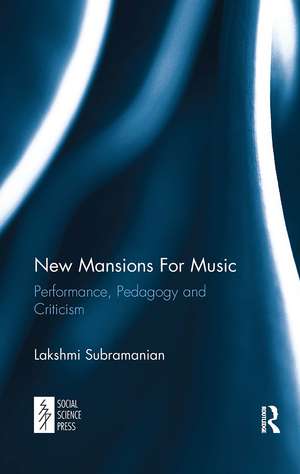New Mansions For Music: Performance, Pedagogy and Criticism
Autor Lakshmi Subramanianen Limba Engleză Paperback – 25 iun 2024
| Toate formatele și edițiile | Preț | Express |
|---|---|---|
| Paperback (1) | 252.02 lei 6-8 săpt. | |
| Taylor & Francis – 25 iun 2024 | 252.02 lei 6-8 săpt. | |
| Hardback (1) | 1001.90 lei 6-8 săpt. | |
| Taylor & Francis – aug 2017 | 1001.90 lei 6-8 săpt. |
Preț: 252.02 lei
Preț vechi: 322.34 lei
-22% Nou
Puncte Express: 378
Preț estimativ în valută:
48.23€ • 50.58$ • 40.15£
48.23€ • 50.58$ • 40.15£
Carte tipărită la comandă
Livrare economică 01-15 aprilie
Preluare comenzi: 021 569.72.76
Specificații
ISBN-13: 9781032652832
ISBN-10: 1032652837
Pagini: 182
Dimensiuni: 138 x 216 mm
Greutate: 0.06 kg
Ediția:1
Editura: Taylor & Francis
Colecția Routledge
Locul publicării:Oxford, United Kingdom
ISBN-10: 1032652837
Pagini: 182
Dimensiuni: 138 x 216 mm
Greutate: 0.06 kg
Ediția:1
Editura: Taylor & Francis
Colecția Routledge
Locul publicării:Oxford, United Kingdom
Public țintă
PostgraduateCuprins
1. Adda and Public Spaces of Sociability before the ICH 2. India Coffee House: A New Space in the City 3. The Workers and the Coffee House: From ‘India’ to ‘Indian’ 4. The Indian Coffee House and the World of Literature 5. Brewing Discontent Instead of Coffee? 6. How Public is the Public Space of the Indian Coffee House? 7. The Middle Class and Coffee Houses: Old and New
Notă biografică
Lakshmi Subramanian is Professor, Department of History and Culture, Jamia Millia Islamia, New Delhi. Her earlier publications include From the Tanjore Court to the Madras Music Academy: A Social History of Music in South India, Oxford University Press, Delhi 2006.
Descriere
This book looks at one of the most ancient classical musical traditions of India, the Karnatik music system. It also contributes to our understanding of the experience of modernity in India through the prism of music. The developments that influenced areas of classical music were pedagogy, performance conventions and music appreciation. In an im
